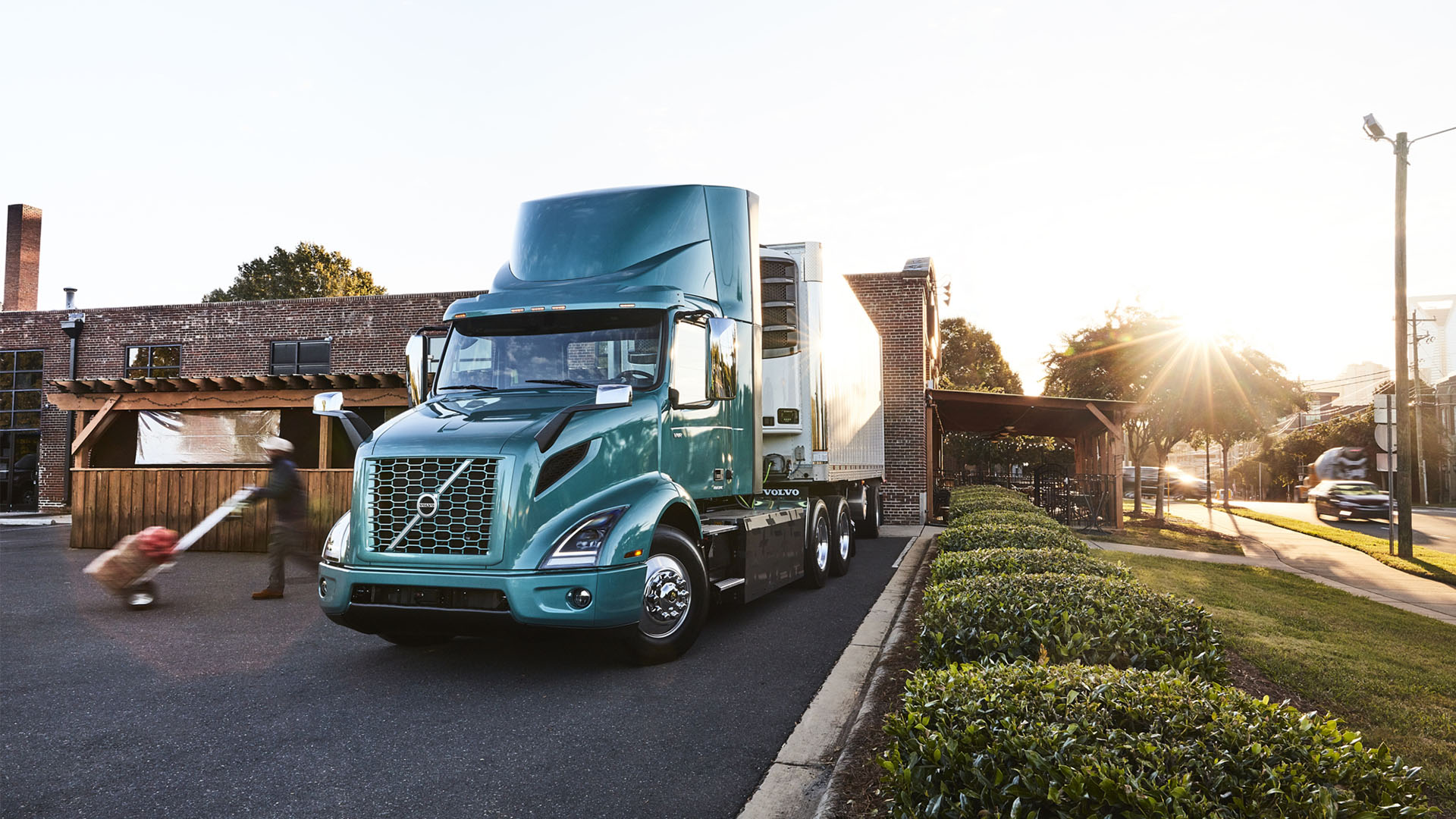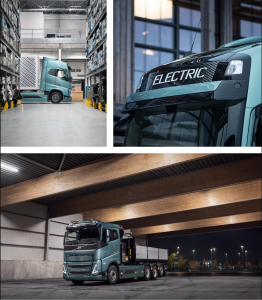- Uncover the impact of Volvo electric trucks funding on zero-emission manufacturing.
- Learn about the $208 million grant accelerating heavy-duty electric vehicle production.
- Explore Volvo’s strategy to achieve 100% fossil-free operations by 2040.
Volvo has secured a substantial boost in electric trucks funding, with the U.S. Energy Department awarding $208 million to fast-track the production of heavy-duty electric vehicles. This significant investment aims to accelerate Volvo’s zero-emission manufacturing and support its commitment to a fossil-free future.
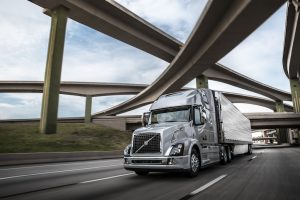
Volvo accelerates toward a fossil-free future with a $208 million boost.
Volvo Electric Trucks Funding: Accelerating Zero-Emission Manufacturing
The recent funding injection is set to revolutionize Volvo’s electric truck production in the United States. The grants will enhance manufacturing capabilities at key facilities, enabling the company to meet the growing demand for zero-emission vehicles. For more insights on Volvo’s advancements in electric truck technology, check out this page.
Energy Department Awards $208 Million Grant
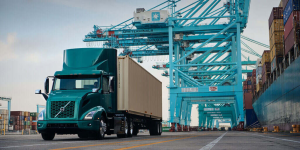
Energy Department grants spark a revolution in zero-emission manufacturing.
The U.S. Energy Department’s substantial grant to Volvo Technology of America is part of a broader initiative to promote sustainable transportation. The $208 million funding will assist in upgrading Volvo Group’s Lehigh Valley Operations truck assembly site in Macungie, Pennsylvania, and the New River Valley truck location in Dublin, Virginia—the world’s largest Volvo truck manufacturing plant.
Enjoying our insights?
Subscribe to our newsletter to keep up with the latest industry trends and developments.
Stay InformedUpgrades to Lehigh Valley and New River Valley Plants
- Lehigh Valley Operations (Macungie, PA): This facility, where Mack Trucks are produced, will undergo significant enhancements to incorporate electric vehicle (EV) components into its assembly lines. The upgrades will enable mixed model assembly, allowing both conventional and electric trucks to be manufactured simultaneously. This approach increases scalability and flexibility in production.
- New River Valley Plant (Dublin, VA): As Volvo’s largest truck manufacturing plant globally, the New River Valley facility will receive substantial investments to expand its electric truck production capabilities. The focus will be on integrating advanced manufacturing processes specific to battery electric vehicles (BEVs) and fuel cell electric vehicles (FCEVs).
Volvo Group’s Commitment to Fossil-Free Operations
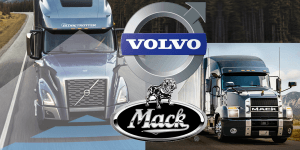
Strategic upgrades in manufacturing processes aim to accommodate both electric and conventional truck production.
Volvo Group has set an ambitious goal to achieve 100% fossil-free operations by 2040. The recent funding aligns with this vision, enabling the company to convert its facilities into zero-emission sites and adopt innovative manufacturing approaches. To understand more about funding dynamics in the trucking industry, follow this link.
Facility Conversions for Mixed Model Assembly
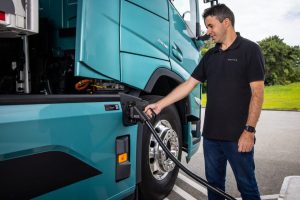
295 new union jobs will fuel the local economy and support growth
The move toward mixed model assembly is a strategic decision to enhance manufacturing efficiency. By producing both conventional and electric trucks on the same production lines, Volvo can rapidly scale up its electric truck output without significant downtime or overhauls.
Employee Training and Powertrain Innovations
Part of the grant will fund comprehensive employee training programs. These initiatives aim to equip the workforce with the necessary skills to produce innovative trucks and zero-emission powertrains. Stephen Roy, chairman of Volvo Group North America and president of Mack Trucks, emphasized the importance of this development:
“Through facility upgrades and employee training, this grant will help our U.S. plants more efficiently produce the innovative trucks and zero-emission powertrain components essential to this transition.”
Hagerstown, Maryland Plant Enhancements
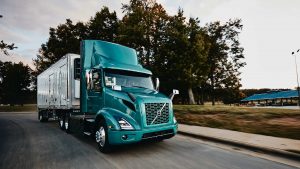
Industry leaders unite to drive the shift toward zero-emission heavy-duty vehicles.
In addition to the main facilities, Volvo’s powertrain plant in Hagerstown, Maryland, will receive upgrades to support the production of zero-emission components. This plant specializes in designing and manufacturing engines, transmissions, and axles for heavy-duty trucks. Learn more about the advancements in electric powertrain technologies that are driving the future of transportation.
Creation of New Union Jobs

Volvo aims for 100% fossil-free operations by 2040.
According to Pennsylvania Senator Bob Casey, the funding will create 295 new union jobs for Volvo and Mack. This development not only supports the company’s growth but also contributes to the local economy by providing high-quality employment opportunities. For additional insights into the DOE’s initiatives supporting sustainable transport, check out this link.
Other Industry Leaders Investing in EV Production
Volvo isn’t the only beneficiary of the Energy Department’s grants. Other major players in the trucking and automotive industry are also receiving substantial funding to accelerate their transition to electric vehicle production.
ZF Axle Drives Marysville Receives $158 Million
- Facility Conversion in Marysville, Michigan: ZF Axle Drives Marysville has been awarded nearly $158 million to convert part of its facility from internal combustion engine driveline component production to electric vehicle components. This move is expected to attract potential new customers seeking advanced EV components.
- Focus on Electric Driveline Components: ZF is expanding its production of electric driveline components to meet the growing demand in the automotive industry. By upgrading its facilities, ZF aims to support manufacturers in their shift toward electrification.
Advancements in battery technology address key challenges in electric trucking.
Cummins Invests in Zero-Emission Powertrains
- $75 Million Investment in Columbus, Indiana: Cummins will invest $75 million, matched by the Energy Department, to convert approximately 360,000 square feet of its engine plant for the manufacturing of zero-emission components and electric powertrain systems.
- Advancements in Hydrogen Fuel Cell Technology: Cummins is a leader in developing hydrogen fuel cell systems for commercial vehicles. The company is also investing in battery electric powertrains to offer a range of zero-emission solutions.
- Commitment to Net-Zero Emissions by 2050: Cummins has set a target to reach net-zero emissions by 2050, aligning with global sustainability goals.
Impact of the Inflation Reduction Act on EV Production
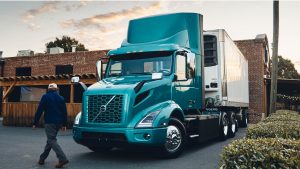
Federal grants aim to catalyze the shift towards more sustainable, zero-emission vehicles.
These grants are part of the $2 billion Domestic Manufacturing Conversion Grant program, available through September 2031. The program supports the domestic production of hybrid, electric, and hydrogen fuel cell vehicles. The funding is linked to appropriations related to the Inflation Reduction Act, aiming to bolster the United States’ position in the global EV market. To explore the impact of the Inflation Reduction Act on the automotive sector, click here.
Encouraging Sustainable Transportation
- Tax Credits and Incentives: The Inflation Reduction Act includes provisions for tax benefits and incentives to companies investing in EV technology, accelerating the shift to zero-emission vehicles. For more on how tax incentives are shaping the industry, visit this page.
- Job Creation and Economic Growth: The initiatives are expected to create thousands of new jobs in the manufacturing sector, particularly in sustainable technologies, contributing to economic growth. Explore the economic impacts of green manufacturing, click here.
How Will Volvo’s Electric Trucks Funding Affect the Industry?
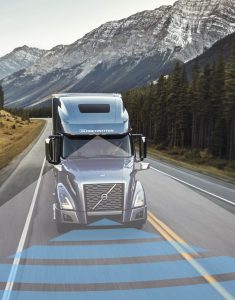
Volvo electric trucks funding accelerates the transition to zero-emission vehicles, supporting a sustainable future in heavy-duty transportation.
The substantial investment in Volvo’s electric truck production is poised to have a significant impact on the heavy-duty vehicle industry. By enhancing manufacturing capabilities and increasing production capacity, Volvo is set to meet the rising demand for zero-emission trucks. For additional insights into the challenges facing electric truck production, explore this page.
Expansion of Electric Truck Models
- Volvo VNR Electric: Designed for regional freight distribution and urban transportation, the Volvo VNR Electric offers reduced emissions and noise levels, making it suitable for urban environments with strict emission regulations. Learn more about Volvo’s VNR Electric model and its features, follow this link.
- Advancements in Battery Technology: Volvo is investing in the development of more efficient batteries with longer ranges and shorter charging times, addressing one of the main challenges in electric trucking. To dive deeper into advancements in battery technology, check out this page.
Infrastructure Development
- Charging Stations: Volvo is collaborating with partners to expand the charging infrastructure necessary to support electric trucks. This includes high-capacity charging stations suitable for heavy-duty vehicles. For detailed information on infrastructure development for electric vehicles, visit this link.
- Telematics and Connectivity: Advanced telematics systems are being integrated into electric trucks to optimize route planning, energy consumption, and vehicle maintenance. Discover more about the role of telematics and technology in modern transportation, explore this page.
What Does This Mean for Zero-Emission Transportation?
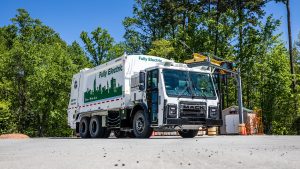
Mixed model assembly enhances scalability and flexibility in production.
The funding not only accelerates Volvo’s zero-emission goals but also signifies a broader shift toward sustainable transportation solutions in the heavy-duty sector. With major players like Volvo, ZF Axle Drives, and Cummins receiving substantial grants, the industry is moving closer to a fossil-free future. For a deeper look into how this funding impacts zero-emission transportation, check out this link.
Global Impact and Leadership
- Setting Industry Standards: Volvo’s advancements in electric truck production position the company as a leader in the global effort to reduce carbon emissions in transportation. For more on global leadership in electric transportation, follow this link.
- International Collaborations: Volvo is part of global initiatives and partnerships aimed at promoting sustainable transportation, including collaborations with governments and other manufacturers. To explore international collaborations in the EV sector, visit this page.
Environmental Benefits
- Reduction in Greenhouse Gas Emissions: Transitioning to electric trucks significantly reduces emissions from one of the largest contributors to greenhouse gases—the transportation sector. For more details on environmental benefits of electric trucks, click here.
- Improved Air Quality: Electric trucks contribute to improved air quality, particularly in urban areas, by eliminating tailpipe emissions. To learn more about air quality improvements through electric vehicles, check out this page.
Challenges and Future Outlook
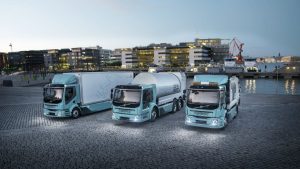
Volvo Electric Trucks Funding is set to redefine sustainable transportation, merging advanced manufacturing with environmental responsibility to shape the future of the heavy-duty vehicle industry.
While the advancements are significant, there are challenges to be addressed:
- Infrastructure Limitations: The current charging infrastructure for heavy-duty electric vehicles is limited. Continued investment and development are necessary to support widespread adoption. To understand the infrastructure challenges and solutions, follow this link.
- Battery Production and Sustainability: The environmental impact of battery production and disposal is a concern. Volvo is exploring sustainable materials and recycling programs to mitigate these issues. For insights into sustainable battery production, visit this page.
- Total Cost of Ownership: The initial cost of electric trucks is higher than traditional diesel trucks. However, lower operating costs and government incentives are helping to bridge the gap. For more on the economic aspects of electric truck adoption, explore this link.
Conclusion
By integrating advanced manufacturing processes, employee training, and facility upgrades, Volvo is taking a significant step toward revolutionizing the heavy-duty electric vehicle market. The company’s commitment to being 100% fossil-free by 2040 is further reinforced by this substantial funding, marking a pivotal moment in the transition to zero-emission transportation.
The collaborative efforts of industry leaders and government initiatives underscore the importance of sustainability in transportation. As infrastructure and technology continue to advance, electric trucks are poised to become a mainstay in the logistics and transportation industry, paving the way for a cleaner, more sustainable future.
Key Developments in Volvo Electric Trucks Funding
- $208 Million Grant Awarded: Volvo receives substantial funding from the U.S. Energy Department to boost electric truck production.
- Facility Upgrades: Enhancements at Lehigh Valley and New River Valley plants enable mixed model assembly for increased scalability.
- Commitment to Fossil-Free Operations: Volvo aims for 100% fossil-free operations by 2040, converting facilities into zero-emission sites.
- Job Creation: The initiative will create 295 new union jobs, supporting local economies.
- Industry-Wide Shift: Additional investments by ZF Axle Drives and Cummins indicate a broader move toward zero-emission heavy-duty vehicles.
- Government Support: Funding is part of the Domestic Manufacturing Conversion Grant program under the Inflation Reduction Act.
Explore External Resources and Insights on Electric Vehicles and Sustainability
Here are some valuable external resources that provide further insights into electric vehicles, funding opportunities, and sustainability initiatives:
- Learn about the latest standards and advancements in the National Network of Electric Vehicle Chargers which aim to make charging more accessible and reliable across different networks. This initiative highlights the commitment to creating good-paying jobs and ensuring service quality through workforce standards like the EVITP. For more details, visit White House’s EV Charging Standards.
- Explore the Commercial Clean Vehicle Credit offered by the IRS, which provides significant tax credits for eligible commercial vehicles, aiming to boost the adoption of environmentally friendly transportation solutions. This credit varies based on the vehicle’s weight and other criteria. For more information on how to apply and benefit from this initiative, visit the IRS’s Clean Vehicle Credit Page.
- Understand the Electric Vehicle (EV) and Fuel Cell Electric Vehicle (FCEV) Tax Credits which have been updated under the Inflation Reduction Act to include benefits at the point of sale, enhancing affordability for consumers. This policy now requires dealers to submit vehicle eligibility details directly to the IRS, streamlining the credit application process. For additional insights, check the AFDC’s Tax Credit Page.
- Dive into the ongoing discussions and Request for Information (RFI) by the U.S. Department of Transportation regarding the infrastructure needs for medium- and heavy-duty electric vehicles. This RFI is part of a broader strategy to decarbonize freight transportation and enhance the national EV charging infrastructure. More about this initiative can be read at Drive Electric’s Official Page.

